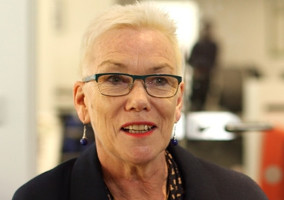Charities need to do more to make volunteering opportunities for older people accessible and flexible, sector leaders said in Parliament yesterday.
Speaking at the All Party Parliamentary Group on Charities and Volunteering, convened by NCVO, on volunteering in later life Kim Roberts, senior campaigns officer at the Charities Aid Foundation outlined a suggestion for a “post careers advice service” to help people “transition out of employment”.
CAF published research on the subject last year which found that many people who will be retiring soon are not prepared for it, would like to volunteer, but don’t know where to go.
She said: “There is a gap between what people are telling us they would like to do and what they are doing.”
It is up to charities to “make it easier to volunteer” she said.
CAF has not fleshed out how a post careers advice service should look because “we are not the best people to design or deliver it” but Roberts that research suggested most people were in favour of it being funded by central government and then delivered locally.
‘We need to lower the barriers’
Dan Jones, director of innovation and change at Ageing Better, said that lowering the barriers to participation and make sure that people don’t “have to jump through hoops” .
He said that research recently carried out by his charity suggested that those who were least likely to get involved were actually those who benefitted the most.
“Age doesn’t determine contribution,” he said. “People are just as likely to contribute in their 70s as they are in their 50s if they have done it before.”
He added that “health can be a significant barrier” and charities need to “do what they can to make it easier for people with health problems” to participate.
Jones also identified ageism as another barrier and said charities need to “offer roles that are flexible”.
“I would like to see organisations thinking much harder about who volunteers are and how they can contribute rather than how they can fit into the organisation,” he said.
‘Social action critical to health’
Oonagh Aitken, chief executive of Volunteering Matters, said: “Social action needs to be seen as critical to improving health and care outcomes.”
She said the role of Volunteering Matters is to help community initiatives “get off the ground”.
“They need our support to get started,” she said. “But they don’t need support all the time.”
But also said that in some cases, such as volunteers supporting vulnerable, “the volunteer has to make a real commitment”.
She also said the narrative needed to change from being about the “cost of an ageing population” to one about how it is possible for “older people to contribute to communities even if they have a disability or are not the typical volunteer”.
Smaller charities need digital support
Baroness Barker, Liberal Democrat peer, called for more digital support for smaller charities to help them reach out to potential volunteers.
She said “local infrastructure is fast disappearing” which has meant that small charities are without the skills and knowledge to attract volunteers.
“I don’t’ think government should direct volunteering,” she said. But it can help by “putting money and resource into a digital programme for charities” which could help them to build websites and set up social media feeds with a “film showing what it is like to volunteer”.
She also said that corporate volunteering needs to focus more on helping charities fill skills gaps.
‘Are we learning from what hasn’t worked?’
Karl Wilding, director of public policy and volunteering at NCVO, said that in terms of how many people volunteer “the needle hardly moves”.
“Are we learning from what hasn’t worked?” he asked. “Is now time for a fundamental reappraisal of what people want from volunteer centres? We might have been wrong in de-funding so many of them?”
Katy Owen, head of the of the Centre for Social Action and Evaluation in the Office for Civil Society, which last year made £4m available for projects for the over 50s, said funding is being aimed a “local organisations right across the country so it is not seen as government-run”.
Roberts said charities need to engage with policy makers now. She said the shared society vision means “there is more opportunity to have conversations about this issue and about other volunteering and charity sector issues than there has been before.”
‘Brokerage is hard’
In response to a question about improving digital platforms to connect potential volunteers with charities Jones said that part of the problem is that “brokerage is hard”.
“It doesn’t become less hard because it is online,” he said.
Janet Thorne, chief executive of Reach, which runs an online matching platform, said that since integrating its service LinkedIn it had seen the number of volunteers increase by 60 per cent.
“This is purely driven by LinkedIn,” she said because it is “an opportunity to get in front of people”.
Related articles












